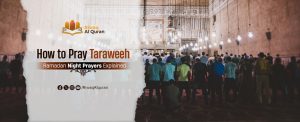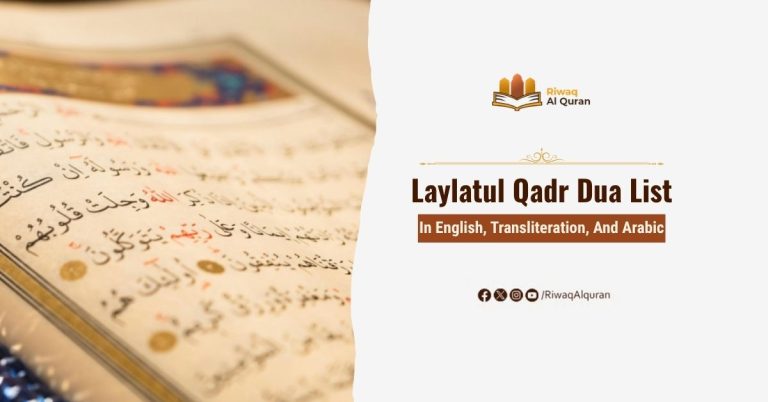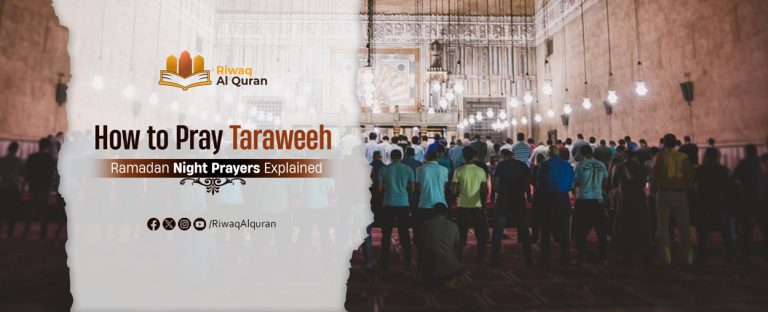What are the suitable Quran Surahs to Memorize? Our noble Quran, made up of 114 Surahs, is filled with mercy and guidance. Some of its surahs are short and easy to remember, yet they carry deep meanings and offer invaluable insights into the essence of Islam. They serve as pillars of faith, providing solace, wisdom, and practical guidance for navigating life’s journey.
In this exploration, we’ll look at some of these easy Quran surahs to memorize, understanding their important lessons for believers, historical context, and how they can guide us in our lives today. So, keep reading this blog!
Table of Contents
Easy Quran Short Surahs For Memorization
In this noble pursuit of knowledge and guidance, we turn our focus to 20 short surahs of the Quran. These surahs, while brief in length, are rich in meaning and filled with valuable lessons as follows.
1. Surah Al-Fatiha (The Opening):
Al-Fatiha, also known as “The Opening,” is the first chapter of the Quran. It consists of seven verses and is often referred to as the essence of the Quran. The surah is recited in every unit of Salah, emphasizing its significance in Islamic worship. Al-Fatiha praises Allah, acknowledges His sovereignty, seeks guidance, and asks for the straight path of believers.
The surah’s themes include the mercy and benevolence of Allah towards His creation, the importance of seeking His guidance, and the concept of divine justice. Memorizing Al-Fatiha provides Muslims with a foundational prayer that encompasses key aspects of faith and devotion.
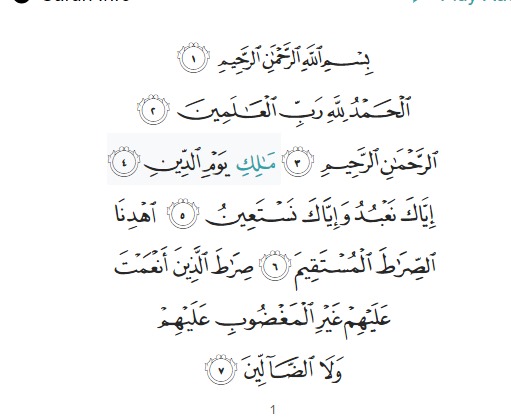
English (Sahih International):
- In the name of Allah, the Entirely Merciful, the Especially Merciful.
- [All] praise is [due] to Allah, Lord of the worlds –
- The Entirely Merciful, the Especially Merciful,
- Sovereign of the Day of Recompense.
- It is You we worship and You we ask for help.
- Guide us to the straight path –
- The path of those upon whom You have bestowed favor, not of those who have evoked [Your] anger or of those who are astray.
Transliteration:
- Bismillāhir-Raḥmānir-Raḥīm
- Al-ḥamdu lillāhi Rabbil-‘ālamīn
- Ar-Raḥmānir-Raḥīm
- Māliki Yawmid-Dīn
- Iyyāka na‘budu wa iyyāka nasta‘īn
- Ihdināṣ-Ṣirāṭal-Mustaqīm
- Ṣirāṭal-laḏīna an‘amta ‘alayhim, ghayril-maghḍūbi ‘alayhim walā ḍ-ḍāllīn
2. Surah Al-Ikhlas (The Sincerity):
Al-Ikhlas is the 112th chapter of the Quran and consists of four verses. It is considered one of the most concise expressions of the concept of monotheism (Tawheed). The surah affirms the oneness and uniqueness of Allah, stating that He is indivisible and beyond comparison. Al-Ikhlas emphasizes the fundamental principle of the Islamic faith, rejecting any form of association with Allah.
Memorizing Al-Ikhlas is highly esteemed in Islam due to its profound theological significance. It serves as a declaration of pure monotheism and a reminder of the simplicity and purity of Islamic belief.
![English (Sahih International):
In the name of Allah, the Entirely Merciful, the Especially Merciful.
[All] praise is [due] to Allah, Lord of the worlds -
The Entirely Merciful, the Especially Merciful,
Sovereign of the Day of Recompense.
It is You we worship and You we ask for help.
Guide us to the straight path -
The path of those upon whom You have bestowed favor, not of those who have evoked [Your] anger or of those who are astray.
Transliteration:
Bismillāhir-Raḥmānir-Raḥīm
Al-ḥamdu lillāhi Rabbil-‘ālamīn
Ar-Raḥmānir-Raḥīm
Māliki Yawmid-Dīn
Iyyāka na‘budu wa iyyāka nasta‘īn
Ihdināṣ-Ṣirāṭal-Mustaqīm
Ṣirāṭal-laḏīna an‘amta ‘alayhim, ghayril-maghḍūbi ‘alayhim walā ḍ-ḍāllīn](https://riwaqalquran.com/wp-content/uploads/2024/09/Surah-Al-Ikhlas-The-Sincerity.jpg)
English (Sahih International):
- In the name of Allah, the Entirely Merciful, the Especially Merciful.
- [All] praise is [due] to Allah, Lord of the worlds –
- The Entirely Merciful, the Especially Merciful,
- Sovereign of the Day of Recompense.
- It is You we worship and You we ask for help.
- Guide us to the straight path –
- The path of those upon whom You have bestowed favor, not of those who have evoked [Your] anger or of those who are astray.
Transliteration:
- Bismillāhir-Raḥmānir-Raḥīm
- Al-ḥamdu lillāhi Rabbil-‘ālamīn
- Ar-Raḥmānir-Raḥīm
- Māliki Yawmid-Dīn
- Iyyāka na‘budu wa iyyāka nasta‘īn
- Ihdināṣ-Ṣirāṭal-Mustaqīm
- Ṣirāṭal-laḏīna an‘amta ‘alayhim, ghayril-maghḍūbi ‘alayhim walā ḍ-ḍāllīn
3. Surah Al-Falaq (The Daybreak):
Al-Falaq is the 113th chapter of the Quran and consists of five verses. It is classified as a “Mu’awwidhatan” or “Seeking Refuge” surah, along with Surah An-Nas. Al-Falaq seeks refuge in Allah from various forms of evil, particularly those that occur during the darkness of night. The surah asks for protection from harmful creatures, such as demons and witches, and from the jealousy and malice of others.
Memorizing Al-Falaq serves as a spiritual shield against unseen dangers and reinforces trust in Allah’s protection and power over all creation.

Sahih International Translation:
- Say, “I seek refuge in the Lord of daybreak
- From the evil of that which He created
- And from the evil of darkness when it settles
- And from the evil of the blowers in knots
- And from the evil of an envier when he envies.”
Transliteration:
- Qul a’udhu bi rabbil-falaq
- Min sharri ma khalaq
- Wa min sharri ghasiqin idha waqab
- Wa min sharri naffathati fi al-‘uqad
- Wa min sharri hasidin idha hasad
4. Surah An-Nas (The Mankind):
An-Nas is the 114th chapter of the Quran and consists of six verses. Like Al-Falaq, it is classified as a “Mu’awwidhatan” or “Seeking Refuge” surah. An-Nas seeks refuge in Allah from the evil whispers of Satan and the harm caused by malicious individuals. The surah emphasizes Allah’s role as the protector of humanity and the source of refuge from all forms of evil.
Memorizing An-Nas provides Muslims with a supplication for seeking divine protection in times of distress and vulnerability. It fosters a sense of trust in Allah’s care and guardianship.
Sahih International Translation:

- Say, “I seek refuge in the Lord of mankind,
- The Sovereign of mankind.
- The God of mankind,
- From the evil of the retreating whisperer –
- Who whispers evil into the breasts of mankind,
- Of jinn and mankind.”
Transliteration:
- Qul a’udhu bi rabbin-nas
- Malikin-nas
- Ilahin-nas
- Min sharri al-waswas il-khannas
- Alladhi yuwaswisu fi sudurin-nas
- Min al-jinnati wa an-nas
5. Surah Al-Masad (The Palm Fiber):
Surah Al-Masad is the 111th chapter of the Quran and consists of five verses. It is named after Abu Lahab, an uncle of the Prophet Muhammad, who vehemently opposed Islam. The surah condemns Abu Lahab and his wife for their hostility towards the Prophet and their rejection of Islam. It warns of the severe punishment they will face in the Hereafter for their disbelief and opposition to the truth.
Memorizing Al-Masad serves as a reminder of the consequences of rejecting faith and opposing the message of Islam. It underscores the importance of humility and submission to Allah’s will.
Sahih International Translation:

- Perish the two hands of Abu Lahab and perish he!
- His wealth will not avail him or that which he gained.
- He will enter to burn in a Fire of blazing flame
- And his wife, the carrier of firewood,
- Around her neck is a rope of palm fiber.
Transliteration:
- Tabbat yada abi lahabin watabb
- Ma aghna ‘anhu maluhu wamakasab
- Sayasla naran dhata lahab
- Wamra’atuhu hammalata al-hatab
- Fi jeediha hablun min masad
6. Surah Al-Kawthar (The Abundance):
Al-Kawthar is the 108th chapter of the Quran and consists of three verses. It was revealed in response to the ridicule and taunts directed at the Prophet Muhammad by his adversaries, who mocked him for not having sons to carry on his legacy.
The surah assures the Prophet of the abundant blessings bestowed upon him by Allah, particularly the gift of abundant progeny and spiritual abundance. It serves as a source of consolation and encouragement for the Prophet during a challenging period. Memorizing Al-Kawthar instills gratitude for Allah’s blessings and strengthens faith in His promises.
Sahih International Translation:

- Indeed, We have granted you, [O Muhammad], the Kawthar.
- So pray to your Lord and sacrifice.
- Indeed, your enemy is the one cut off.
Transliteration:
- Inna atainaka al-kawthar
- Fasalli li rabbika wanhar
- Inna shani’aka huwa al-abtar
7. Surah Al-Kafirun (The Disbelievers):
Al-Kafirun is the 109th chapter of the Quran and consists of six verses. It was revealed in Makkah during a period of intense opposition to Islam. The surah addresses the polytheists of Makkah, asserting the irreconcilable difference between Islamic monotheism and polytheism. It rejects any compromise in faith and affirms the believers’ commitment to truth. Memorizing Al-Kafirun reinforces the importance of unwavering faith in the face of adversity and opposition. It encourages us to remain steadfast in our beliefs and to reject falsehood.
Sahih International Translation:

- Say, “O disbelievers,
- I do not worship what you worship.
- Nor are you worshippers of what I worship.
- Nor will I be a worshipper of what you worship.
- Nor will you be worshippers of what I worship.
- For you is your religion, and for me is my religion.”
Transliteration:
- Qul ya ayyuhal-kafirun
- La a’budu ma ta’budun
- Wa la antum ‘abiduna ma a’bud
- Wa la ana ‘abidum ma ‘abattum
- Wa la antum ‘abiduna ma a’bud
- Lakum dinukum waliya din
8. Surah An-Nasr (The Help):
An-Nasr is the 110th chapter of the Quran and consists of three verses. It was revealed in Madinah during the later stages of the Prophet Muhammad’s life. The surah celebrates the imminent victory of Islam and the triumph of truth over falsehood. It encourages believers to express gratitude for Allah’s assistance and serves as a source of hope and encouragement.
Memorizing An-Nasr fosters optimism and trust in Allah’s promise of victory for the believers. It reminds Muslims that ultimate success belongs to those who remain steadfast in their faith.
Sahih International Translation:

- When the victory of Allah has come and the conquest,
- And you see the people entering into the religion of Allah in multitudes,
- Then exalt Him with praise of your Lord and ask forgiveness of Him. Indeed, He is ever Accepting of Repentance.
Transliteration:
- Iza jaa’a nasrullahi wal-fath
- Wara’ayta annasa yadkhuloona fee dinillahi afwaja
- Fasabbih bihamdi rabbika wastaghfirhu innahu kana tawwaba
Experience Riwaq Al Quran Classes
Watch real moments from our live sessions at Riwaq Al Quran and see how we bring learning to life. These clips highlight our interactive, student-focused approach—designed to keep learners engaged, motivated, and actively involved in every step of their educational journey.
9. Surah Al-Ma’un (The Small Kindnesses):
Al-Ma’un is the 107th chapter of the Quran and consists of seven verses. It was revealed in Makkah and addresses the hypocritical behavior of those who neglect their prayers and fail to assist the needy. The surah emphasizes the inseparable connection between faith and righteous conduct, condemning superficial acts of worship devoid of compassion and charity.
Memorizing Al-Ma’un instills a sense of social responsibility and empathy for the less fortunate. It underscores the importance of sincerity in worship and the performance of acts of kindness towards others.
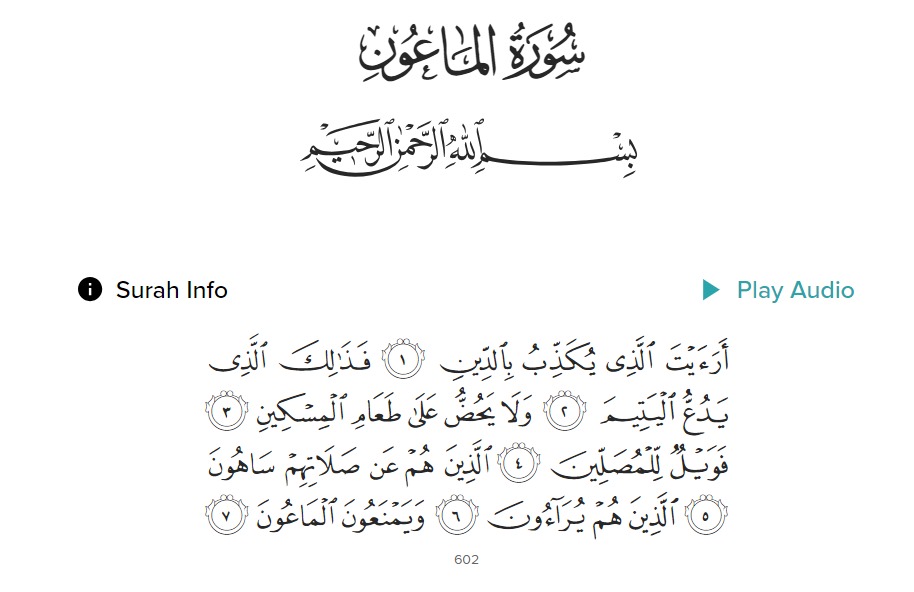
Sahih International Translation:
- Have you seen the one who denies the Recompense?
- For that is the one who drives away the orphan
- And does not encourage the feeding of the poor.
- So woe to those who pray
- [But] who are heedless of their prayer—
- Those who make show [of their deeds]
- And withhold [simple] assistance.
Transliteration:
- Ara’ayta allathee yukazzibu biddin
- Fa dhalika allathee yad’u’ul-yateem
- Wala yahuddu ‘ala ta’aami al-miskeen
- Fa wailun lil-musalleen
- Alladheena hum ‘an salaatihim sahoon
- Alladheena hum yura’oon
- Wayamna’oon al-ma’oon
10. Surah Quraish (The Quraish):
Quraish is the 106th chapter of the Quran and consists of four verses. It addresses the Quraish tribe, the custodians of the Kaaba in Makkah, and highlights the blessings bestowed upon them by Allah. The surah emphasizes their security and provisions, which are attributed to their custodianship of the sacred sanctuary.
Memorizing Al-Quraish fosters appreciation for Allah’s favors and encourages gratitude for His blessings. It serves as a reminder of the importance of humility and acknowledgment of divine generosity.
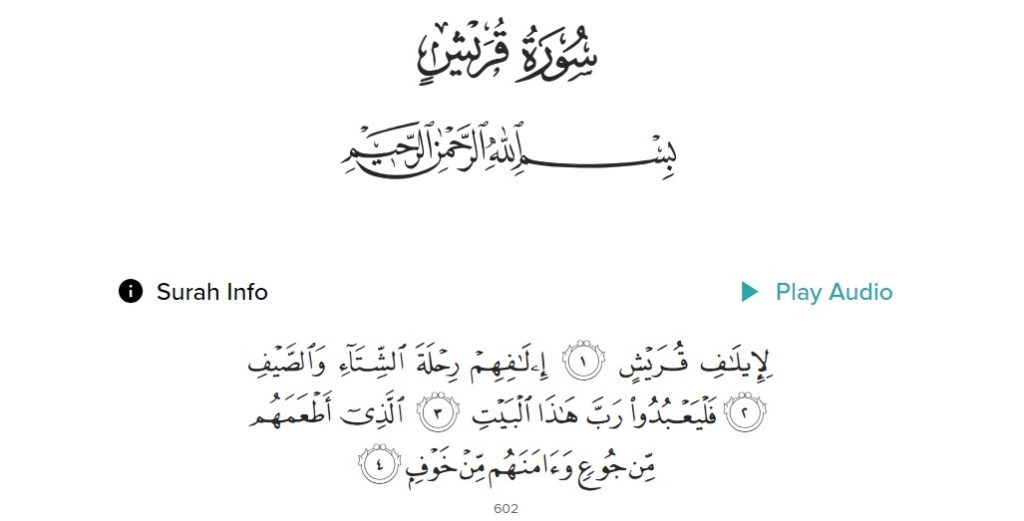
Sahih International Translation:
- For the accustomed security of the Quraysh—
- Their accustomed security [in] the caravan of winter and summer—
- Let them worship the Lord of this House,
- Who has fed them, [saving them] from hunger and made them safe, [saving them] from fear.
Transliteration:
- Li-ilaafi quraysh
- ILAAFIHIM RIHLATASH-SHITA’I WAS-SAIF
- FALIYA’BUDU RABBA HAATHAL-BAYT
- ALLADHEE AAT’AAHUM MIN JU’AAW
- WA AMNAHUM MIN KHOWF
11. Surah Al-Feel (The Elephant):
Al-Feel is the 105th chapter of the Quran and consists of five verses. It recounts the miraculous event of Allah’s protection of the Kaaba from Abraha’s army, which attempted to destroy it with elephants. The surah serves as a reminder of Allah’s power and protection of His sacred places.
Memorizing Al-Feel instills awe and reverence for Allah’s sovereignty and strengthens faith in His ability to safeguard His religion and its sanctuaries. It also underscores the significance of seeking Allah’s protection in times of adversity.
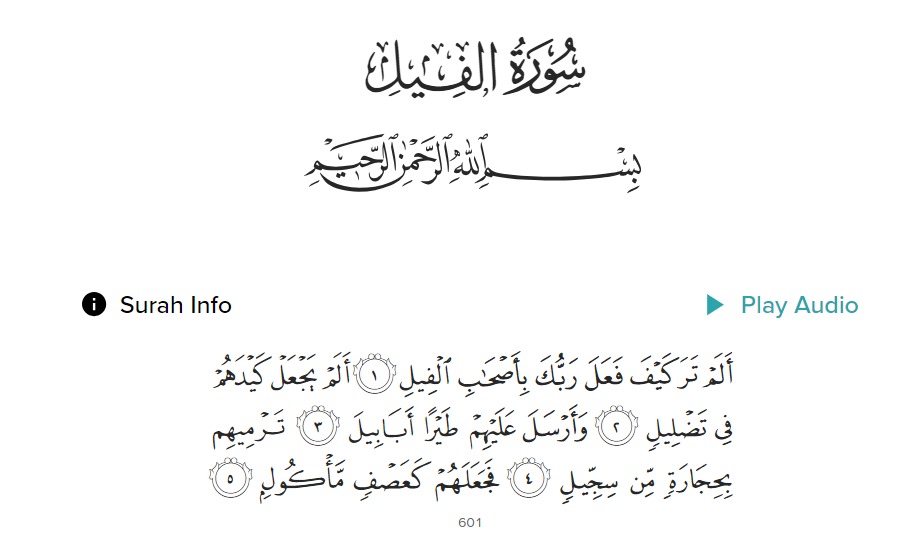
Sahih International Translation:
- Have you (O Muhammad (Peace be upon him)) (not) seen how your Lord dealt with the Owners of the Elephant (the army of the elephant)?
- Did He not make their plot go astray?
- And sent against them birds, in flocks,
- Striking them with stones of baked clay,
- Made them like eaten straw.
Transliteration:
- Alam tara kayfa fa’ala rabbuka bi-as-haabi al-feel
- Alam yaj’al kaydahum fee tadhleel
- Wa arsala ‘alayhim tayran ababeel
- Tarmeehim bi hijaaratin min sijjeel
- Faja’alahum ka’asfim ma’kool
12. Surah Al-Asr (The Time):
Al-Asr is the 103rd chapter of the Quran and consists of three verses. It emphasizes the value of time and the fleeting nature of human life. The surah asserts that success lies in faith, righteous deeds, and enjoining truth and patience.
Memorizing Al-Asr serves as a reminder of the importance of utilizing time wisely and prioritizing actions that lead to salvation. It encourages Muslims to reflect on the fleeting nature of life and to invest their time in pursuits that yield eternal rewards.
13. Surah Al-Takathur (The Rivalry in Worldly Increase):
Al-Takathur is the 102nd chapter of the Quran and consists of eight verses. It warns against the distraction of worldly pursuits and the accumulation of wealth. The surah reminds humans of the transitory nature of worldly gains and the inevitability of death.
Memorizing Al-Takathur encourages reflection on life’s priorities and the pursuit of spiritual enrichment. It serves as a reminder of the fleeting nature of worldly possessions and the importance of investing in the Hereafter.
14. Surah Al-Qadr (The Night of Decree):
Al-Qadr is the 97th chapter of the Quran and consists of five verses. It highlights the significance of Laylat al-Qadr, the Night of Decree, during which the Quran was revealed. The surah emphasizes the immense value of this night, which is better than a thousand months.
Memorizing Al-Qadr fosters appreciation for the Quran and encourages increased worship during this blessed night. It serves as a reminder of the importance of seeking Allah’s mercy and forgiveness during this auspicious time.
15. Surah Al-Qari’ah (The Striking):
Al-Qari’ah is the 101st chapter of the Quran and consists of 11 verses. It vividly describes the Day of Judgment as a striking calamity that will cause widespread upheaval and distress. The surah emphasizes the accountability of individuals for their actions and their ultimate reckoning before Allah.
Memorizing Al-Qari’ah fosters awareness of the Hereafter and the importance of righteous conduct. It serves as a reminder of the consequences of one’s actions and the urgency of preparing for the Day of Judgment.
16. Surah Al-Tin (The Fig):
Al-Tin is the 95th chapter of the Quran and consists of eight verses. It draws analogies between the creation of humans and the natural world, highlighting the inherent goodness of divine guidance. The surah underscores the significance of faith and righteous deeds in attaining success.
Memorizing Al-Tin fosters an appreciation for Allah’s creation and the guidance provided in the Quran. It serves as a reminder of the interconnectedness of all creation and the importance of obedience to Allah’s commandments.
17. Surah Al-Alaq (The Clot):
Al-Alaq is the 96th chapter of the Quran and consists of 19 verses. It emphasizes the importance of knowledge and learning, particularly the revelation of the Quran. The surah narrates the story of the first revelation to the Prophet Muhammad, highlighting the divine origins of Islam.
Memorizing Al-Alaq underscores the centrality of knowledge in Islam and encourages the pursuit of learning. It serves as a reminder of the transformative power of divine guidance and the importance of seeking knowledge.
18. Surah Al-Zalzalah (The Earthquake):
Al-Zalzalah is the 99th chapter of the Quran and consists of eight verses. It describes the upheaval and chaos of the Day of Judgment, emphasizing its magnitude and severity. The surah underscores the accountability of all individuals and the disclosure of deeds on that day.
Memorizing Al-Zalzalah fosters awareness of the consequences of one’s actions and the importance of preparing for the Hereafter. It serves as a reminder of the inevitability of the Day of Judgment and the need for righteousness in this life.
19. Surah Al-Adiyat (The Courser):
Al-Adiyat is the 100th chapter of the Quran and consists of 11 verses. It vividly describes charging horses as a symbol of human arrogance and the pursuit of worldly desires. The surah warns against heedlessness and emphasizes the importance of humility before Allah.
Memorizing Al-Adiyat serves as a reminder of the fleeting nature of worldly pursuits and the ultimate importance of faith and obedience. It encourages believers to reflect on the consequences of pride and to prioritize spiritual growth over worldly gain.
20. Surah Al-Zalzalah (The Earthquake):
Al-Zalzalah is the 99th chapter of the Quran and consists of eight verses. It describes the upheaval and chaos of the Day of Judgment, emphasizing its magnitude and severity. The surah underscores the accountability of all individuals and the disclosure of deeds on that day.
Memorizing Al-Zalzalah fosters awareness of the consequences of one’s actions and the importance of preparing for the Hereafter. It serves as a reminder of the inevitability of the Day of Judgment and the need for righteousness in this life.
These detailed explanations provide insights into the themes, historical context, and significance of each surah, enriching the understanding of their messages and fostering a deeper connection with the Quranic text.
Why Students Love Learning with Riwaq Al Quran
Hear directly from our students about how Riwaq Al Quran Academy has transformed their connection with the Book of Allah. Their experiences reflect the dedication, care, and quality that guide every step of our teaching.
Start Memorizing the Quran Short Surahs with Riwaq!
At Riwaq Al Quran, we hold in high regard the significance of each surah in the Quran, recognizing the profound impact they have on the spiritual development of believers.
Our mission is twofold: to foster a deep understanding of the Quran’s teachings and to cultivate a strong connection between students and the divine message. We believe that by exploring the profound messages of each Surah and learning them by heart, students can gain a deeper appreciation for their faith and a clearer understanding of their purpose in life.
Join us and enroll in our Special Quran Memorization Classes as we embark on this transformative journey through the surahs of the Quran. Together, let us seek knowledge, guidance, and inspiration that will enrich our lives and strengthen our connection with Allah.
We offer several courses such as:
- Online courses for kids.
- Online Quran classes for kids and adults.
- Online Arabic courses
- Online Ijazah courses
- Online Islamic Studies courses.
Here are a sample of our set of Quran Courses that will be helpful for you:
- Online Tafseer Course: Delve into Quranic meanings with our insightful online Tafseer course.
- Noorani Qaida Online: Learn Quranic basics efficiently through our Noorani Qaida online program.
- Online Quran Recitation Course: Enhance Quranic recitation skills through our expert-led online course.
- Online Tajweed Classes: Master Tajweed rules for beautiful Quranic recitation in online classes.
- Quran Memorization Online Course: Memorize the Quran effectively with our specialized online memorization course.
- Online Qirat Course: Explore diverse Qirat styles with our comprehensive online Qirat course.
Online Quran Classes for Kids: Nurture a love for the Quran in kids through interactive online classes.


Conclusion:
Focusing on shorter surahs of the Quran offers profound lessons. Surah Al-Fatiha emphasizes seeking Allah’s guidance and acknowledging His sovereignty, while Surah Al-Ikhlas emphasizes monotheism. Surah Al-Falaq and Surah An-Nas seek refuge in Allah from various evils, fostering trust in His protection. Surah Al-Masad warns against rejecting faith, Surah Al-Kawthar assures blessings, and Surah Al-Kafirun rejects polytheism.
Surah An-Nasr celebrates victory for Islam, Surah Al-Ma’un stresses sincerity in worship and kindness, and Surah Quraish highlights Allah’s blessings. Surah Al-Asr urges righteous deeds and patience, Surah Al-Takathur warns against worldly distractions, and Surah Al-Qadr emphasizes the value of Laylat al-Qadr. Surah Al-Qari’ah describes the severity of the Day of Judgment, while Surah Al-Tin underscores the importance of faith and obedience. These surahs offer profound insights into faith, guidance, and the consequences of actions.






